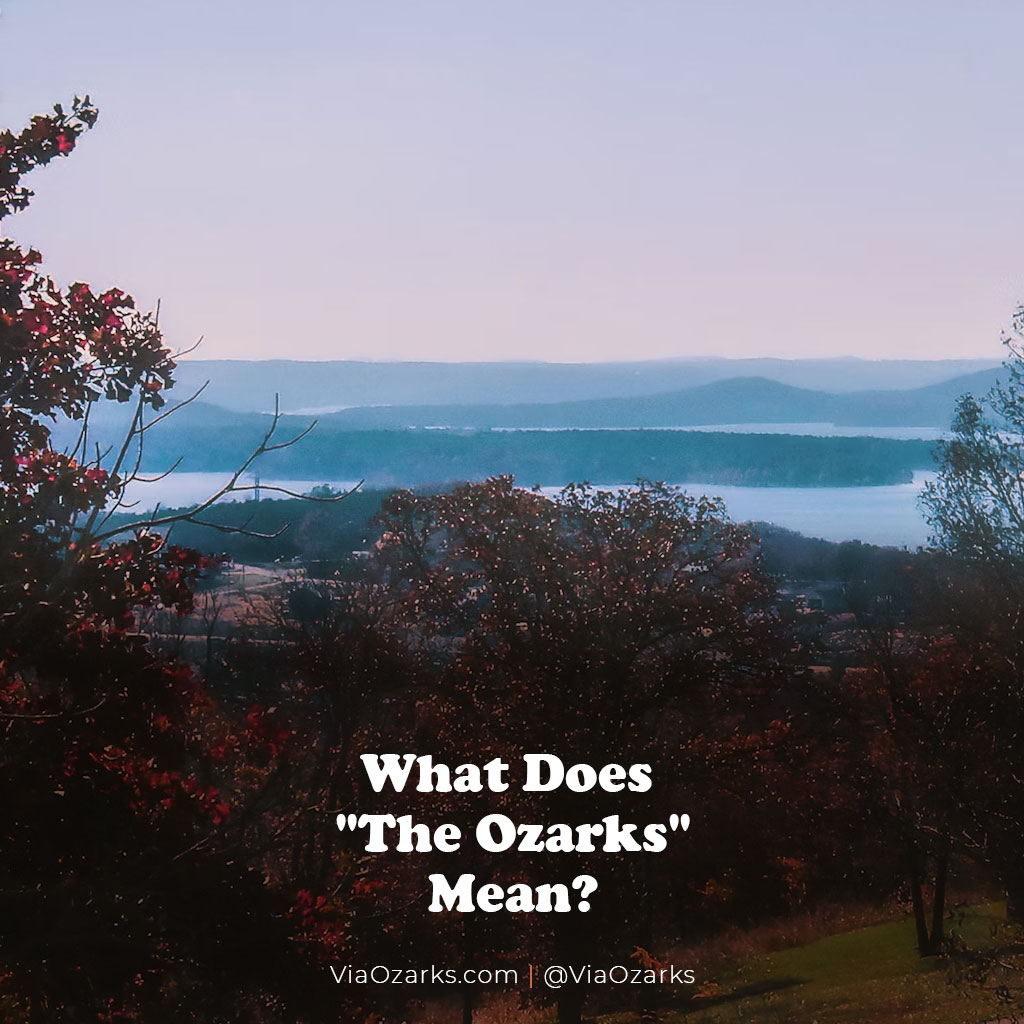If you’ve ever wandered through the lush landscapes of southern Missouri, northern Arkansas, or the most northeast corner of Oklahoma, you might have heard the term “The Ozarks.” This enchanting region is known for its picturesque beauty, unique culture, and outdoor adventures. But what exactly does “The Ozarks” mean? Let’s dive into the origins, history, and significance of this captivating name.
The Origin and Etymology of “Ozarks”
The term “Ozarks” is believed to have originated from the French term “Aux Arcs,” which means “of the arches” or “at the arches.” The French explorers who traveled through the region in the 17th and 18th centuries named it for the numerous natural stone arches found in the area. Over time, the term evolved into “Ozarks.”
- French Influence: The French were among the first Europeans to explore this region, and their influence is evident in many place names and the culture of the area. “Aux Arcs” was a reference to the natural rock formations that were prominent in the landscape.
- Evolution of the Name: As English-speaking settlers moved into the region, the pronunciation and spelling of “Aux Arcs” gradually morphed into “Ozarks.” By the 19th century, “The Ozarks” had become the common name for this highland region.
Alternative Names for The Ozarks
While “The Ozarks” is the most widely recognized name, the region has been known by several other names throughout history.
- The Ozark Mountains: This name emphasizes the mountainous terrain of the region. Although the Ozarks are not as high as the Rockies or the Appalachians, they are characterized by rugged hills and deep valleys.
- The Ozark Plateau: Geologists often refer to the area as the Ozark Plateau, highlighting its broad, uplifted landforms. This term is more technical and is used mainly in scientific contexts.
The Geography of The Ozarks
The Ozarks cover a vast area, stretching across southern Missouri, northern Arkansas, and into small parts of Oklahoma and Kansas. This region is divided into several distinct areas, each with its own unique characteristics.
- The Boston Mountains: Located in northwest Arkansas, this sub-region features some of the highest elevations in the Ozarks. It’s known for its steep, rugged terrain and beautiful vistas.
- The Springfield Plateau: This area, primarily in Missouri, is characterized by gently rolling hills and fertile soil. It’s less rugged than the Boston Mountains but equally scenic.
- The Salem Plateau: Also in Missouri, the Salem Plateau is known for its karst topography, with numerous caves, sinkholes, and springs.
The Cultural Significance of The Ozarks
Beyond its natural beauty, the Ozarks are rich in cultural history and traditions. The region has been home to various Native American tribes, European explorers, and settlers who have all left their mark.
- Native American Heritage: The Osage, Quapaw, and other tribes lived in the Ozarks long before European settlers arrived. They hunted, fished, and farmed in the region, and their influence is still evident today.
- European Settlers: French and Spanish explorers were among the first Europeans to visit the Ozarks. They established trade routes and interacted with the Native American tribes. Later, English-speaking settlers from the eastern United States moved into the region, bringing their customs and traditions.
The Ozarks in Modern Times
Today, the Ozarks are a popular destination for tourists and outdoor enthusiasts. The region offers a wide range of activities, from hiking and fishing to exploring historic sites and enjoying local festivals.
- Outdoor Adventures: The Ozarks are a haven for outdoor activities. Popular spots include the Buffalo National River, Table Rock Lake, and the Mark Twain National Forest. Visitors can enjoy hiking, kayaking, fishing, and camping in these beautiful natural settings.
- Cultural Attractions: The region is also rich in cultural attractions. Branson, Missouri, is known for its live entertainment and theme parks. Eureka Springs, Arkansas, is famous for its Victorian architecture and vibrant arts scene.
The History of the Term “Ozarks”
The term “Ozarks” has a long and fascinating history. It reflects the region’s French heritage and the evolution of language and culture over centuries.
- Early Exploration: The first European explorers in the Ozarks were French trappers and traders in the 17th century. They named the region “Aux Arcs” because of the natural arches they encountered.
- Settlement and Development: As settlers moved into the area, the name evolved to “Ozarks.” By the 19th century, it was commonly used to describe the highland region in southern Missouri and northern Arkansas.
- Modern Usage: Today, “The Ozarks” is a term that evokes images of natural beauty, outdoor adventure, and a unique cultural heritage. It’s used to describe not only the geographical region but also the lifestyle and traditions of the people who live there.
Visiting The Ozarks
If you’re planning a trip to the Ozarks, you’re in for a treat. Here are some tips to make the most of your visit:
- Explore the Outdoors: The Ozarks are known for their stunning natural beauty. Be sure to visit some of the region’s national parks, lakes, and hiking trails.
- Immerse Yourself in the Culture: Take the time to learn about the history and traditions of the Ozarks. Visit local museums, attend festivals, and interact with the friendly locals.
- Enjoy Local Cuisine: The Ozarks are famous for their hearty, home-cooked meals. Don’t miss the chance to try some local favorites like fried catfish, barbecue, and homemade pies.
Wrapping Up
So, what does “The Ozarks” mean? It’s more than just a name. It’s a reflection of the region’s rich history, diverse geography, and vibrant culture. From the French explorers who first named it “Aux Arcs” to the modern-day adventurers who flock to its scenic landscapes, the Ozarks continue to captivate and inspire. Whether you’re exploring its rugged mountains, enjoying its tranquil lakes, or immersing yourself in its unique heritage, the Ozarks offer an unforgettable experience.
So pack your bags, hit the road, and discover the magic of the Ozarks for yourself. You won’t be disappointed!

